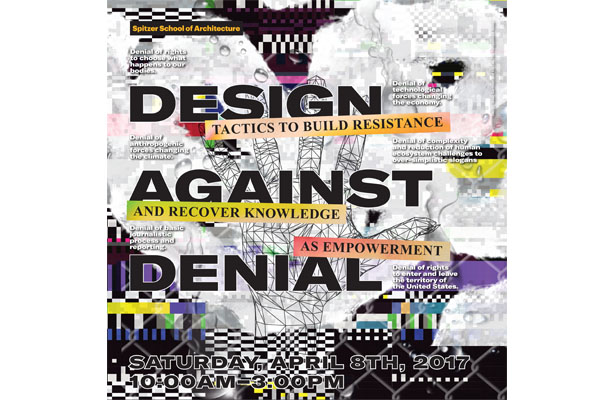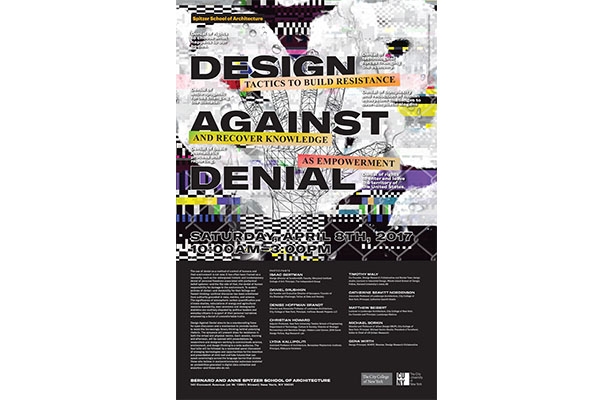Special Events
Design Against Denial Symposium
Tactics to Build Resistance and Recover Knowledge as Empowerment
10:00 a.m. – 3:00 p.m.
Spitzer School Sciame Auditorium (107)
Organized by the Master of Landscape Architecture program
The use of denial as a method of control of humans and their environment is not new; it has often been framed as a necessity, such as the widespread historic and contemporary denial of personal freedoms associated with puritanical belief systems—and the flip side of that, the denial of human responsibility for damage to the environment. To sustain policies of denial—and deniability for their failings and flawed thinking—political discourse has been untethered from authority grounded in data, metrics, and science. The significance of atmospheric carbon quantification and climate studies, calculations of energy and agricultural resource availability, even economic and demographic statistics are routinely disputed by political leaders and everyday citizens in support of their personal narratives empowering a denial of uncomfortable truths.
Design Against Denial aims to be a countervailing force for open discussion and a mechanism to promote tactics to resist the increasingly binary thinking behind polarizing rhetoric. The symposium will present ideas for resistance in both the virtual and physical realms. Each session, morning and afternoon, will be opened with presentations by researchers and designers working to communicate science, environment, and design thinking to a wide audience. The four talks will be followed by a moderated panel discussion of emerging technologies and opportunities for the invention and presentation of vivid real and fake futures that can speak convincingly across the language barrier that divides those who believe in socioenvironmental outcomes modeled on probabilities grounded in digital data collection and analytics—and those who do not.
Bios:
Isaac Gertman is designer, writer, educator, and typography enthusiast, with a keen interest in the overlapping social, cultural, and infrastructural systems found in cities. His professional roles are several: Principal of The Independent Group, Design Director of Terreform, and Full-time Faculty at Maryland Institute College of Art.
Denise Hoffman Brandt, RLA is Associate Professor and Director of the Graduate Landscape Architecture Program at the City College of New York and Principal of Hoffman Brandt Projects, LLC. Her work focuses on landscape as ecological infrastructure — the social, cultural and environmental systems that generate urban form and sustain urban life.
Christian Howard is a narrative designer working in games, education and interactive media. He is an Adjunct Professor in the Department of Technology, Culture & Society at NYU’s Tandon School of Engineering, and serves as Education Director at the Rap Research Lab and Narrative Design Lead at Hidden Level Games.
Alison Irvine is a founding organizer of the Biodesign Challenge, a university competition that partners artists, designers, and scientists to envision the future of biotechnology. She researches creative practices that engage the public with basic science and new technologies in ways that promote social reflection and ethical scientific conduct. Alison has also written articles on the intersection of art, science, and social justice for Imagine Science Films and The Center for Genetics and Society.
Lydia Kallipoliti is an architect, engineer and scholar, currently an Assistant Professor of Architecture at Rensselaer Polytechnic Institute and the Center for Architecture, Science and Ecology in New York. She is the founder of ANAcycle thinktank and the author of Closed Worlds, Or, What is the Power of Shit for which she received the ACSA award for creative achievement.
Tim Maly is a writer and design critic. His work focuses on the role of speculation, magic, and words at the strange edges of architecture and design. He’s the acting Graduate Program Director for the Department of Industrial Design at RISD. He is a fellow at Harvard’s metaLAB, and co-founder of The Dredge Research Collaborative. He is @doingitwrong on Twitter.
Catherine Seavitt Nordenson, ASLA, AIA, is an associate professor at the City College of New York and principal of Catherine Seavitt Studio. Her research explores design adaptation to sea level rise in urban coastal environments and examines novel landscape restoration practices addressing climate change. Her book Structures of Coastal Resilience is forthcoming from Island Press, 2017.
Matthew Seibert is a Lecturer at City College of New York’s Spitzer School of Architecture and a founding principal at Landscape Metrics, a visualization studio specializing in transforming data into compelling visual narratives. Current research interests are grounded in representation of place, including dynamic cartography, parafictional histories of flood control infrastructure, and the leveraging of video game development engines. Matthew’s work has earned recognition from both private and governmental institutions, as well as a variety of media outlets.
Michael Sorkin is President of Terreform, a non-profit urban research center and publisher of UR Books, the Principal of Michael Sorkin Studio, an international design practice, Distinguished Professor of Architecture and Director of the Graduate Program in Urban Design at the CCNY, architecture critic for The Nation, and author or editor of twenty books.
Gena Wirth is the Design Principal at SCAPE. Trained in landscape architecture, urban planning and horticulture, Gena draws from her interdisciplinary training to create ecologically rich and culturally relevant landscapes from the infrastructural scale to the site level. Gena leads the design on several significant projects in the office. She is an active member of the Dredge Research Collaborative, a non-profit group that studies the design of sedimentary systems nationwide.
Schedule
9:30 coffee and presentation set up
10: 00 welcome and introduction of theme/speakers Hoffman Brandt
10:10 Panelist presentations: Physical
10:10-10:25 Isaac Gertman
10:25-11:40 Gena Wirth
11:40-11:55 Timothy Maly
10:55-11:10 Denise Hoffman Brandt
11:10-12:00 Moderated discussion Michael Sorkin
12:00 Lunch
1:00 Panelist presentations: Virtual
1:00-1:15 Matthew Seibert
1:15-1:30 Alison Irvine
1:30-1:45 Christian Howard
1:45-2:00 Catherine Seavitt
2:00-2:50 Moderated discussion Lydia Kallipoliti
2:50 Closing remarks (end by 3:00) Michael Sorkin



